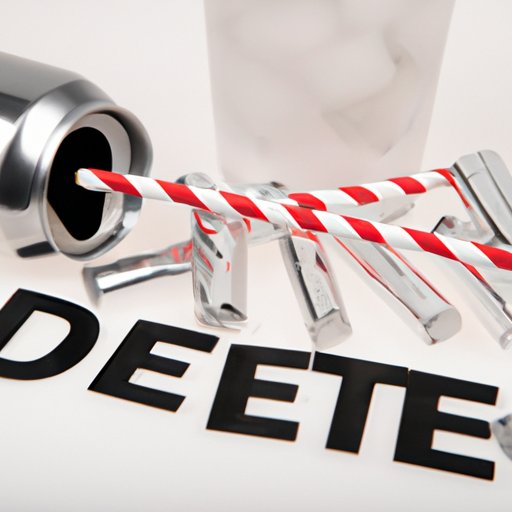
I. Introduction
Diet soda has long been touted as a healthier alternative to regular soda, especially for those looking to lose weight. However, recent studies have brought into question whether or not this is truly the case. In this article, we will explore the truth about diet soda and weight loss, discussing its pros and cons, as well as providing recommendations for healthier alternatives.
II. The Truth About Diet Soda and Weight Loss: What the Science Says
Scientific studies on the efficacy of diet soda in promoting weight loss have been mixed. While some studies have shown that drinking diet soda can lead to weight loss, others have found no correlation between the two.
One particular study published in the American Journal of Clinical Nutrition found that people who consumed diet soda regularly actually had a higher body mass index (BMI) than those who did not. The study concluded that the artificial sweeteners in diet soda could lead to overeating and weight gain.
III. Why Diet Soda May Not Be the Best Choice for Weight Loss (and What to Drink Instead)
One of the main reasons why diet soda may not be the best choice for weight loss is the link between artificial sweeteners and sugar cravings. While diet soda may seem like a calorie-free alternative to regular soda, consuming artificial sweeteners can actually make you crave more sugar, leading to overeating and ultimately weight gain.
Instead of diet soda, consider drinking water, herbal tea, green tea, or infused water for a hydrating, calorie-free choice. These options not only quench your thirst but also provide health benefits like antioxidants and anti-inflammatory properties.
IV. The Hidden Dangers of Diet Soda: How It Can Sabotage Your Weight Loss Goals
Although diet soda may be marketed as a healthy alternative to regular soda, it has hidden dangers that can sabotage your weight loss goals. The artificial sweeteners found in diet soda, such as aspartame and sucralose, have been linked to a host of negative health effects. Studies have shown that long-term consumption of artificial sweeteners can actually impair your metabolism and lead to weight gain.
Additionally, some research has suggested that sweeteners in diet soda can alter your gut bacteria, increasing the risk of metabolic syndrome, which is a combination of risk factors that can lead to heart disease, stroke, and type 2 diabetes. Though more research is needed to fully understand this connection, it’s another reason why diet soda may not be your best choice for weight loss.
V. Can Diet Soda Actually Help with Weight Loss? Debunking the Myths and Misconceptions
Despite many misconceptions, diet soda does not promote weight loss. Some myths suggest that it can burn fat or replace exercise, but these claims are unfounded. In fact, a study published in the Journal of the American Geriatrics Society found that people who drank diet soda regularly had a higher risk of abdominal obesity than those who did not.
VI. The Link Between Diet Soda and Weight Gain: Understanding the Connection
Recent scientific studies have shown a clear link between diet soda and weight gain. Drinking diet soda can lead to overeating as well as an increase in cravings for sugary, high-calorie foods.
This is because artificial sweeteners found in diet soda can disrupt your body’s natural ability to regulate calorie intake. Over time, your body can become addicted to diet soda, leading to overeating and weight gain.
VII. The Pros and Cons of Drinking Diet Soda for Weight Loss: Is It Really Worth It?
While there are some pros to drinking diet soda, such as providing a low-calorie alternative to regular soda, there are also many cons. The negative effects of artificial sweeteners can lead to overeating and weight gain, which can ultimately negate any benefits of drinking diet soda for weight loss.
If you choose to drink diet soda as part of your weight loss plan, it’s important to do so in moderation. Limit your intake to no more than one can per day, and pair it with healthy foods to ensure that you’re getting the nutrients your body needs to function properly.
VIII. The Ultimate Guide to Incorporating Diet Soda into Your Weight Loss Plan
If you decide to incorporate diet soda into your weight loss plan, there are some tips you can follow to minimize the negative effects and make the most of the benefits. For one, limit your intake to one can per day or less. Additionally, drink plenty of water and other calorie-free beverages throughout the day to stay hydrated and avoid sugar cravings.
Another tip is to pair your diet soda with healthy, nutrient-dense foods that will provide you with the energy and nutrients your body needs to function at its best. This can help mitigate any negative effects of artificial sweeteners and promote weight loss.
IX. Conclusion
In conclusion, diet soda may not be the best choice for weight loss due to its negative effects on metabolism and the link between artificial sweeteners and sugar cravings. While there are some pros to drinking diet soda, it’s important to make informed decisions about what you put into your body.
If you’re looking to lose weight, consider opting for healthier alternatives like water, herbal tea, and green tea. And always consult with a medical professional for personalized advice on the best weight loss plan for you.





